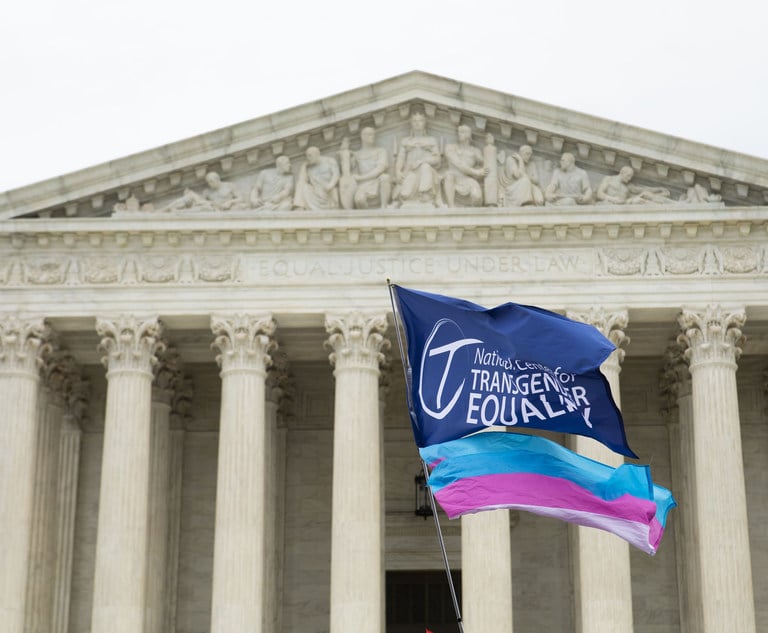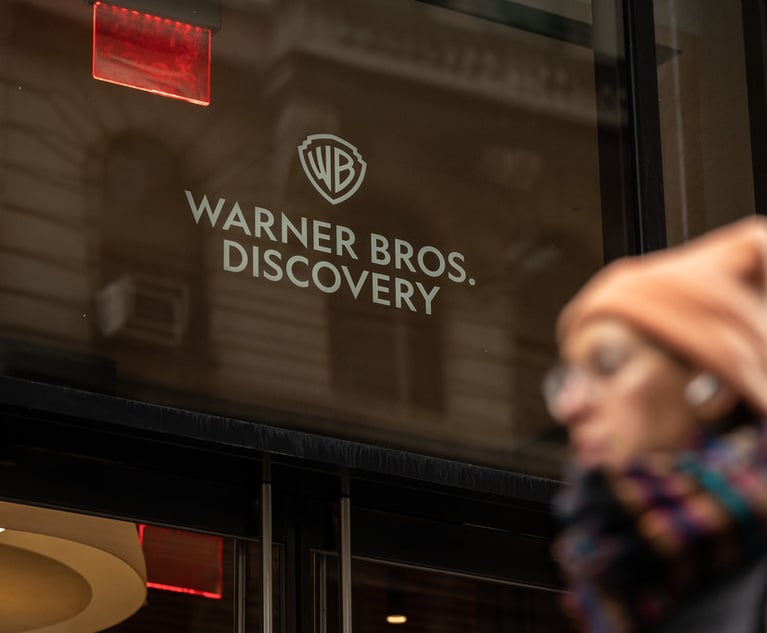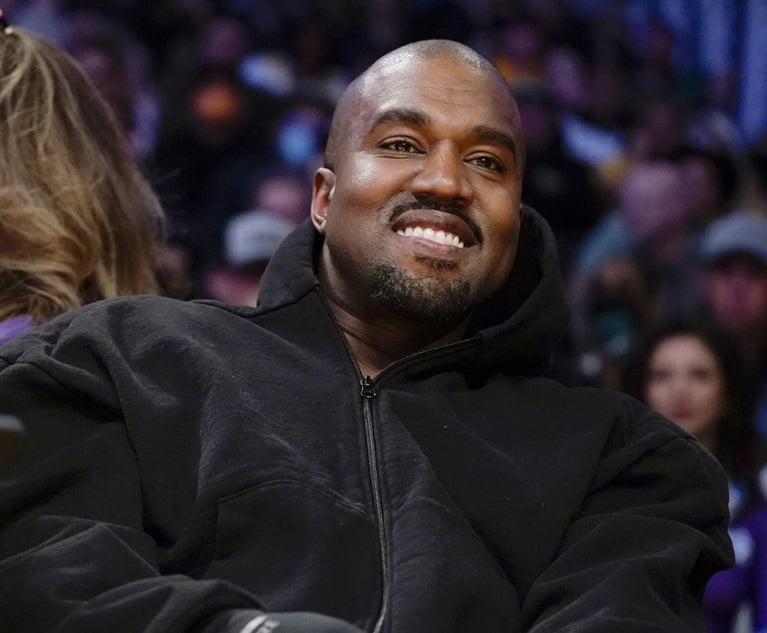 Michael Jackson's “Michael” album. (Photo: Courtesy photo)
Michael Jackson's “Michael” album. (Photo: Courtesy photo)Beat It: Sony's Claims King of Pop Sang on Disputed Tracks Is Protected, Non-Commercial Speech, Court Says
California's Second District Court of Appeal found that representations that the King of Pop sang on all the tracks on the posthumous album "Michael" were statements of opinion rather than fact since only producers—a co-defendant in the suit alongside the label and the estate—actually knew the singer's true identity.
August 29, 2018 at 06:04 PM
3 minute read
A state appellate court in California has tossed consumer protection and unfair competition claims against Sony Music Entertainment and the Estate of Michael Jackson over representations that the “King of Pop” was the lead singer on all the original songs released on the posthumous album “Michael.”
The ruling, issued Tuesday by the Second District Court of Appeal, is a win for the music label, the estate, and their lawyers at Katten Muchin Rosenman and Kinsella Weitzman Iser Kump & Aldisert.
Katten's Zia Modabber, lead defense attorney, didn't respond to a request for comment Tuesday.
Plaintiffs represented by Moss Bollinger in Sherman Oaks, California, filed a class action lawsuit in 2014 claiming that defendants misleadingly represented that Jackson was the lead singer on each of the vocal tracks, when a soundalike sang on three of those tracks. Members of Jackson's family, including his mother, have questioned whether it is actually his voice on the songs “Breaking News,” “Monster” and “Keep Your Head Up.” The plaintiffs further claim that the songs' producers—co-defendants in the case who are not involved in the appeal—failed to produce requested outtakes and demos that could help show whether Jackson was the singer or not.
Los Angeles County Superior Court Judge Ann Jones previously sided with the plaintiffs in finding that representations on the album cover and a promotional video pointing to Jackson as the singer were commercial speech subject to regulation.
But the Second District Court of Appeal disagreed and overturned that portion of her ruling on Tuesday. Justice Elwood Lui wrote that the identity of the artist on the three disputed tracks was a controversial issue of interest to Michael Jackson fans, and that the identity of the lead singer was “integral” to the artistic significance of the songs. “Under these circumstances, appellants' statements about the identity of the artist were not simply commercial speech but were subject to full First Amendment protection,” Lui wrote. “They are therefore outside the scope of an actionable unfair competition or consumer protection claim in this case.”
At the trial court, Jones had previously found that representations by one of Sony's lawyers—Kinsella Weitzman name partner Howard Weitzman—about the company's investigations and conclusions that Jackson was the singer were protected speech. Likewise, Jones previously found that statements by producer Edward Joseph Cascio on “The Oprah Winfrey Show” that Jackson performed the lead vocals were protected under the First Amendment.
At the Second District, Lui wrote that the entire controversy was “a matter of significant public interest” and that the album cover and promotion video “staked out a position in that controversy by identifying the singer as Michael Jackson.”
“Because appellants lacked actual knowledge of the identity of the lead singer on the disputed tracks, they could only draw a conclusion about that issue from their own research and the available evidence,” Lui wrote. “Under these circumstances, appellant's representations about the identity of the singer amounted to a statement of opinion rather than fact.”
Read the full opinion here:
Read more:
This content has been archived. It is available through our partners, LexisNexis® and Bloomberg Law.
To view this content, please continue to their sites.
Not a Lexis Subscriber?
Subscribe Now
Not a Bloomberg Law Subscriber?
Subscribe Now
NOT FOR REPRINT
© 2024 ALM Global, LLC, All Rights Reserved. Request academic re-use from www.copyright.com. All other uses, submit a request to [email protected]. For more information visit Asset & Logo Licensing.
You Might Like
View All
Court rejects request to sideline San Jose State volleyball player on grounds she’s transgender
4 minute read


Federal Judge Rejects Teams' Challenge to NASCAR's 'Anticompetitive Terms' in Agreement
Trending Stories
Who Got The Work
Michael G. Bongiorno, Andrew Scott Dulberg and Elizabeth E. Driscoll from Wilmer Cutler Pickering Hale and Dorr have stepped in to represent Symbotic Inc., an A.I.-enabled technology platform that focuses on increasing supply chain efficiency, and other defendants in a pending shareholder derivative lawsuit. The case, filed Oct. 2 in Massachusetts District Court by the Brown Law Firm on behalf of Stephen Austen, accuses certain officers and directors of misleading investors in regard to Symbotic's potential for margin growth by failing to disclose that the company was not equipped to timely deploy its systems or manage expenses through project delays. The case, assigned to U.S. District Judge Nathaniel M. Gorton, is 1:24-cv-12522, Austen v. Cohen et al.
Who Got The Work
Edmund Polubinski and Marie Killmond of Davis Polk & Wardwell have entered appearances for data platform software development company MongoDB and other defendants in a pending shareholder derivative lawsuit. The action, filed Oct. 7 in New York Southern District Court by the Brown Law Firm, accuses the company's directors and/or officers of falsely expressing confidence in the company’s restructuring of its sales incentive plan and downplaying the severity of decreases in its upfront commitments. The case is 1:24-cv-07594, Roy v. Ittycheria et al.
Who Got The Work
Amy O. Bruchs and Kurt F. Ellison of Michael Best & Friedrich have entered appearances for Epic Systems Corp. in a pending employment discrimination lawsuit. The suit was filed Sept. 7 in Wisconsin Western District Court by Levine Eisberner LLC and Siri & Glimstad on behalf of a project manager who claims that he was wrongfully terminated after applying for a religious exemption to the defendant's COVID-19 vaccine mandate. The case, assigned to U.S. Magistrate Judge Anita Marie Boor, is 3:24-cv-00630, Secker, Nathan v. Epic Systems Corporation.
Who Got The Work
David X. Sullivan, Thomas J. Finn and Gregory A. Hall from McCarter & English have entered appearances for Sunrun Installation Services in a pending civil rights lawsuit. The complaint was filed Sept. 4 in Connecticut District Court by attorney Robert M. Berke on behalf of former employee George Edward Steins, who was arrested and charged with employing an unregistered home improvement salesperson. The complaint alleges that had Sunrun informed the Connecticut Department of Consumer Protection that the plaintiff's employment had ended in 2017 and that he no longer held Sunrun's home improvement contractor license, he would not have been hit with charges, which were dismissed in May 2024. The case, assigned to U.S. District Judge Jeffrey A. Meyer, is 3:24-cv-01423, Steins v. Sunrun, Inc. et al.
Who Got The Work
Greenberg Traurig shareholder Joshua L. Raskin has entered an appearance for boohoo.com UK Ltd. in a pending patent infringement lawsuit. The suit, filed Sept. 3 in Texas Eastern District Court by Rozier Hardt McDonough on behalf of Alto Dynamics, asserts five patents related to an online shopping platform. The case, assigned to U.S. District Judge Rodney Gilstrap, is 2:24-cv-00719, Alto Dynamics, LLC v. boohoo.com UK Limited.
Featured Firms
Law Offices of Gary Martin Hays & Associates, P.C.
(470) 294-1674
Law Offices of Mark E. Salomone
(857) 444-6468
Smith & Hassler
(713) 739-1250






